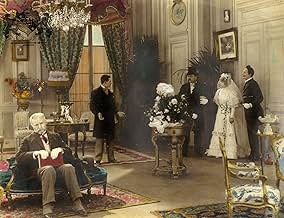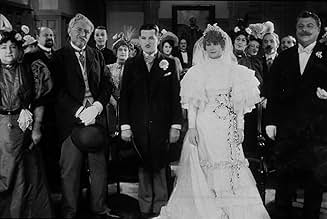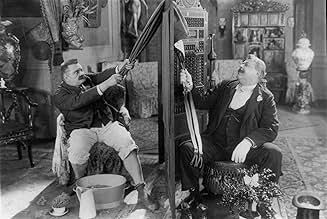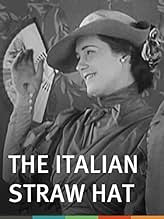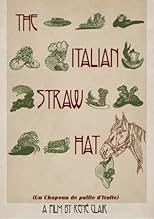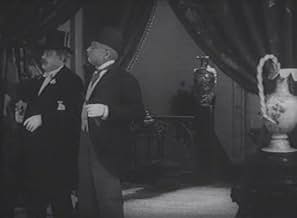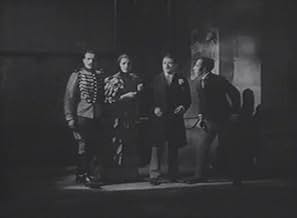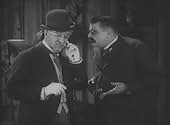IMDb-BEWERTUNG
6,8/10
979
IHRE BEWERTUNG
Füge eine Handlung in deiner Sprache hinzuOn his way through the woods to his marriage, Fadinard's horse eats the hat of a married lady spending here a few moments with her lover. Fadinard has to find the very same rare hat to avoid... Alles lesenOn his way through the woods to his marriage, Fadinard's horse eats the hat of a married lady spending here a few moments with her lover. Fadinard has to find the very same rare hat to avoid her dishonor. This will greatly disturb his own marriage.On his way through the woods to his marriage, Fadinard's horse eats the hat of a married lady spending here a few moments with her lover. Fadinard has to find the very same rare hat to avoid her dishonor. This will greatly disturb his own marriage.
- Regie
- Drehbuch
- Hauptbesetzung
Alice Tissot
- Une cousine
- (as Mme Alice Tissot)
Alexej Bondireff
- Un cousin
- (as M. Alexis Bondi)
Marise Maia
- La mariée
- (as Mlle Maryse Maia)
Yvonneck
- Nonancourt
- (as M. Yvonneck)
Louis Pré Fils
- Cousin Bobin
- (as M. Pré fils)
Albert Préjean
- Fadinard, le marié
- (as M. Albert Préjean)
Geymond Vital
- Le lieutenant Tavernier
- (as M. Vital Geymond)
Olga Tschechowa
- Anaïs de Beauperthuis
- (as Mme Olga Tschekova)
Paul Ollivier
- L'oncle Vézinet
- (as M. Paul Olivier)
Alex Allin
- Félix
- (as M. Alex Allin)
André Volbert
- Le maire
- (as M. Volbert)
Jim Gérald
- Beauperthuis
- (as M. Jim Gérald)
Lya Christy
- Une invitée de la noce
- (as Christie)
Nino Constantini
- Un invité de la noce
- (as Nino Costantini)
A. Debriège
- Une invitée de la noce
- (as Albany Debriège)
Empfohlene Bewertungen
I should point out from the outset that I was probably in the wrong frame of mind for a movie like this. Today was a pretty extreme example of "one of those days" for me. I sat down to watch this, definitely wanting a laugh. But any movie was going to have to work extra hard to get a laugh out of me on this crappy day, and this one didn't really do the job. I should have probably gone with something simple and sure-fire, like a Buster Keaton movie, or a Woody Allen, or a Monty Python. Or maybe I should have just gone for a long bike ride. But I watched this instead.
This is one of those society comedies, with a large cast of characters, and various complicated goings on. Most of the humor derives from people trying to put a normal happy face on for the benefit of society, while meanwhile things are spinning out of control beneath the surface. It reminded me a little bit of Fawlty Towers, with John Cleese, for some reason. It's the same kind of humor. You've probably seen a lot of the gags in 10,000 TV sitcoms by now, but I suppose this stuff was a lot fresher in 1927. And most of it was pretty well done, I'll admit.
The story itself is simple, but you have to pay a lot of attention to keep track of all the moment-to-moment details. And I guess that's where the movie failed for me today. My mind kept wandering, and I'd have to rewind the tape to figure out what was going on, and I'd get annoyed. I was really feeling the lack of dialogue in this one. I watch a lot of silent films. They appeal to me for some reason I can't explain. But this movie felt incomplete to me. I felt it would have worked better as a talkie. But maybe it was just the mood I was in.
Anyway, there were several individual scenes that I thought were brilliant, and definitely made me sit up and take notice. One was worthy of a Seinfeld episode: it's a wedding scene; a woman notices her husband's necktie is undone, and she repeatedly nudges him and fiddles with her neck. The husband takes no notice. He sits there like a lump. But another character instinctively reaches to check his tie. This starts a chain reaction, and pretty soon everyone in the church is checking their ties, except for the husband, who's still sitting there oblivious. Another great scene is when the groom at the wedding imagines the angry military man back at his house, vandalizing everything, tossing all his possessions out the windows, tearing down walls--the film lapses into total surrealism; this is Rene Clair at his visual best. I love this scene.
For now, I'm going to rate this a 7/10. But I'll try to catch it again some day, when I'm in a better and more attentive mood, and I think I'll like it a lot better.
This is one of those society comedies, with a large cast of characters, and various complicated goings on. Most of the humor derives from people trying to put a normal happy face on for the benefit of society, while meanwhile things are spinning out of control beneath the surface. It reminded me a little bit of Fawlty Towers, with John Cleese, for some reason. It's the same kind of humor. You've probably seen a lot of the gags in 10,000 TV sitcoms by now, but I suppose this stuff was a lot fresher in 1927. And most of it was pretty well done, I'll admit.
The story itself is simple, but you have to pay a lot of attention to keep track of all the moment-to-moment details. And I guess that's where the movie failed for me today. My mind kept wandering, and I'd have to rewind the tape to figure out what was going on, and I'd get annoyed. I was really feeling the lack of dialogue in this one. I watch a lot of silent films. They appeal to me for some reason I can't explain. But this movie felt incomplete to me. I felt it would have worked better as a talkie. But maybe it was just the mood I was in.
Anyway, there were several individual scenes that I thought were brilliant, and definitely made me sit up and take notice. One was worthy of a Seinfeld episode: it's a wedding scene; a woman notices her husband's necktie is undone, and she repeatedly nudges him and fiddles with her neck. The husband takes no notice. He sits there like a lump. But another character instinctively reaches to check his tie. This starts a chain reaction, and pretty soon everyone in the church is checking their ties, except for the husband, who's still sitting there oblivious. Another great scene is when the groom at the wedding imagines the angry military man back at his house, vandalizing everything, tossing all his possessions out the windows, tearing down walls--the film lapses into total surrealism; this is Rene Clair at his visual best. I love this scene.
For now, I'm going to rate this a 7/10. But I'll try to catch it again some day, when I'm in a better and more attentive mood, and I think I'll like it a lot better.
10insomnia
I recently saw "The Italian Straw Hat" for the second time; on the silver screen yet! The plot is simple.A horse chews up a lady's straw hat.Her escort demands that it be replaced. This leads to all manner of complications. Slight? Perhaps. Funny? Absolutely hilarious - with not a word spoken!! If any reader gets a chance to see this film, or Clair's 'American' films - "The Ghost Goes West", "And Then There Were None", and: "I Married A Witch" - DO!
"Un Chapeau De Paille D'Italie" can be considered, by this German count's standards, as a transgressor silent film in spite of its classical conventionalism; this particular Teutonic riddle has a Germanic and even logical explanation that will be understood by the longhaired silent youngsters around the world right now.
"Un Chapeau De Paille D'Italie" was directed by the great but French silent director Herr René Clair in the silent year of 1928, after he had directed important, avant-garde, experimental and overall, non conventional silent oeuvres such "Entr'acte" (1924), "Paris Qui Dort" (1925), "Le Voyage Imaginaire" (1925) or "La Tour" (1928); so, having this in mind, then the Germanic assessment mentioned before by this Herr Graf has a solid basis. "Un Chapeau " is a completely different and classic film in comparison with those earlier Clair films and this doesn't mean that "Un Chapeau " is a minor work in Herr Clair 's career; on the contrary, the film is a remarkable, stylized and even provocative comedy.
The incident of the Italian straw hat occurs just before our hero marries, and leads to a series of well placed and paced episodes. The elegant and hilarious scenes depicting the troubles and crossed situations among the just married couple and their wedding guests with the adulterous couple, achieve very remarkable moments. The skillful use of the camera emphasizes the rhythm depending the different scenes, and includes the camera tricks and techniques that Herr Clair was so fond of. The result is a vigorous and sophisticated comedy with a irreverent undercurrent subject in the main plot: a just married man must assume the complicated task of protecting an adulterer.
Helping our hero in such a hazardous mission are excellent supporting actors, playing peculiar characters who are involved unnoticed in this peculiar wedding and will suffer the happenings around the Italian straw hat, a hilarious gallery of guests who have had the misfortune to be part of such a troublesome wedding.
The film is placed at the end of the old XIX century probably in order to take advantage of the human behaviours and fashion of those old times in which the ladies wore elegant hats ( those fräuleins of nowadays showing their loose hair in public!, Mein Gott! ). There is a careful atmosphere of ancient and decadent custom ( faithful characteristics, after all, in Herr Clair films ) that suits the film perfectly. Herr Clair has directed a "classic", stylized and cynical silent comedy that has the same original merits of his most experimental early works.
And now, if you'll allow me, I must temporarily take my leave because this German Count must find his Prussian helmet in order to eat his breakfast properly.
"Un Chapeau De Paille D'Italie" was directed by the great but French silent director Herr René Clair in the silent year of 1928, after he had directed important, avant-garde, experimental and overall, non conventional silent oeuvres such "Entr'acte" (1924), "Paris Qui Dort" (1925), "Le Voyage Imaginaire" (1925) or "La Tour" (1928); so, having this in mind, then the Germanic assessment mentioned before by this Herr Graf has a solid basis. "Un Chapeau " is a completely different and classic film in comparison with those earlier Clair films and this doesn't mean that "Un Chapeau " is a minor work in Herr Clair 's career; on the contrary, the film is a remarkable, stylized and even provocative comedy.
The incident of the Italian straw hat occurs just before our hero marries, and leads to a series of well placed and paced episodes. The elegant and hilarious scenes depicting the troubles and crossed situations among the just married couple and their wedding guests with the adulterous couple, achieve very remarkable moments. The skillful use of the camera emphasizes the rhythm depending the different scenes, and includes the camera tricks and techniques that Herr Clair was so fond of. The result is a vigorous and sophisticated comedy with a irreverent undercurrent subject in the main plot: a just married man must assume the complicated task of protecting an adulterer.
Helping our hero in such a hazardous mission are excellent supporting actors, playing peculiar characters who are involved unnoticed in this peculiar wedding and will suffer the happenings around the Italian straw hat, a hilarious gallery of guests who have had the misfortune to be part of such a troublesome wedding.
The film is placed at the end of the old XIX century probably in order to take advantage of the human behaviours and fashion of those old times in which the ladies wore elegant hats ( those fräuleins of nowadays showing their loose hair in public!, Mein Gott! ). There is a careful atmosphere of ancient and decadent custom ( faithful characteristics, after all, in Herr Clair films ) that suits the film perfectly. Herr Clair has directed a "classic", stylized and cynical silent comedy that has the same original merits of his most experimental early works.
And now, if you'll allow me, I must temporarily take my leave because this German Count must find his Prussian helmet in order to eat his breakfast properly.
It has been a few years since I have seen this film, but at the time I rated it with the best comedies ever made, and filled with that graceful combination of high style and laugh-out-loud humor that seems to have disappeared from movie making except in an occasional rarity like Amelie--which to be honest, is more charming and touching than really funny.
Granted, comedy, more than any other genre, seems to be a matter of personal taste, but for those who can appreciate comedy that skewers and at the same time celebrates social mores. that relies on visual humor rather than jokes, and that doesn't need to resort to bathroom vulgarisms to get a laugh, then you might enjoy this film as much as I did.
Granted, comedy, more than any other genre, seems to be a matter of personal taste, but for those who can appreciate comedy that skewers and at the same time celebrates social mores. that relies on visual humor rather than jokes, and that doesn't need to resort to bathroom vulgarisms to get a laugh, then you might enjoy this film as much as I did.
Silent film fans are really in for a treat with this DVD. Once again, Flicker Alley has released a terrific DVD--with a nearly pristine print (very rare for a silent), some nice special features as well as two different sound tracks for this movie! Each time I see one of their films, I marvel at the amazing care they give each release--and it's the class of the industry.
"The Italian Straw Hat" is film that was a bit short on plot but is still well worth seeing. This is because the director, René Clair, did a masterful job with this movie--with great camera-work and composition throughout. Unfortunately, despite looking great the plot keeps me from giving the movie an even higher score. The problem is that although the story is entertaining, it just had too many holes--too many situations that simply were too hard to believe and could have EASILY been resolved...but weren't.
The film begins with a bridegroom traveling by horse and buggy to his wedding. On the way, he gets out and his horse keeps walking--and finds a straw hat that it begins to eat! Naturally, the lady who owned the hat was angry and her lover was ready to fight. The bridegroom tried to pay for it but the couple insisted he find a replacement hat. And, they follow him into town and continue to insist--even moving into his apartment and threatening to destroy the place unless he get an identical hat. It turns out it's because the woman is married to a different man and doesn't want to have to explain to him what happened to the hat. But why the couple squatted for many hours in the house seemed forced--and why the bridegroom didn't just go to the police made no sense either. But, it did have lots of cute and mildly funny moments--even if the story just made no sense.
Overall, the film is expertly filmed but inconsequential because of the writing. It's worth seeing if you love silents or if you want to see a silent that manages to have very, very few intertitle cards yet tells the story very well. Otherwise, there are better silents out there--even with the great Flicker Alley package.
"The Italian Straw Hat" is film that was a bit short on plot but is still well worth seeing. This is because the director, René Clair, did a masterful job with this movie--with great camera-work and composition throughout. Unfortunately, despite looking great the plot keeps me from giving the movie an even higher score. The problem is that although the story is entertaining, it just had too many holes--too many situations that simply were too hard to believe and could have EASILY been resolved...but weren't.
The film begins with a bridegroom traveling by horse and buggy to his wedding. On the way, he gets out and his horse keeps walking--and finds a straw hat that it begins to eat! Naturally, the lady who owned the hat was angry and her lover was ready to fight. The bridegroom tried to pay for it but the couple insisted he find a replacement hat. And, they follow him into town and continue to insist--even moving into his apartment and threatening to destroy the place unless he get an identical hat. It turns out it's because the woman is married to a different man and doesn't want to have to explain to him what happened to the hat. But why the couple squatted for many hours in the house seemed forced--and why the bridegroom didn't just go to the police made no sense either. But, it did have lots of cute and mildly funny moments--even if the story just made no sense.
Overall, the film is expertly filmed but inconsequential because of the writing. It's worth seeing if you love silents or if you want to see a silent that manages to have very, very few intertitle cards yet tells the story very well. Otherwise, there are better silents out there--even with the great Flicker Alley package.
Wusstest du schon
- WissenswertesRestored in April 2016 through a partnership between the Cinematheque Francaise and the San Francisco Silent Film Festival, with the support of the CNC and Arte France. The new 4K restoration is based on the René Clair's original camera negative which is preserved at the Cinematheque Francaise.
- PatzerAfter the chair has been loaded onto the cart in a medium shot, the next long shot shows it in a different position.
- Alternative VersionenThere is an Italian edition of this film on DVD, distributed by DNA srl, "UN CAPPELLO DI PAGLIA DI FIRENZE (1928) + I MARRIED A WITCH (Ho sposato una strega, 1942)" (2 Films on a single DVD), re-edited with the contribution of film historian Riccardo Cusin. This version is also available for streaming on some platforms.
- VerbindungenFeatured in Historia del cine: Epoca muda (1983)
Top-Auswahl
Melde dich zum Bewerten an und greife auf die Watchlist für personalisierte Empfehlungen zu.
Details
- Erscheinungsdatum
- Herkunftsländer
- Sprachen
- Auch bekannt als
- The Horse Ate the Hat
- Drehorte
- Produktionsfirma
- Weitere beteiligte Unternehmen bei IMDbPro anzeigen
- Laufzeit
- 1 Std. 48 Min.(108 min)
- Farbe
- Sound-Mix
- Seitenverhältnis
- 1.33 : 1
Zu dieser Seite beitragen
Bearbeitung vorschlagen oder fehlenden Inhalt hinzufügen

